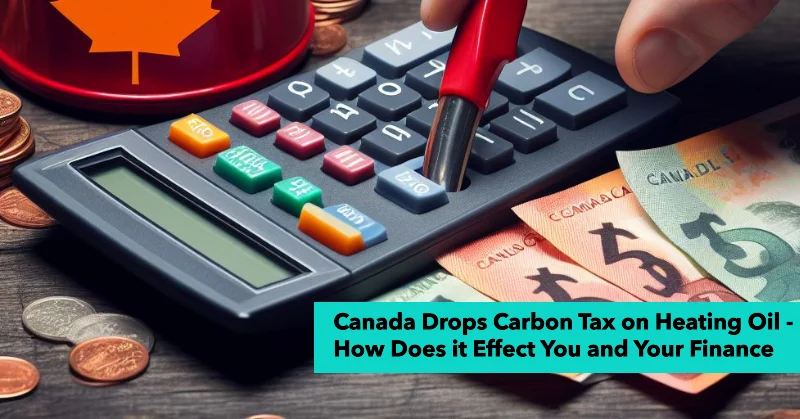For Advertising Contact Us
Canada Drops Carbon Tax on Heating Oil – How Does it Effect You and Your Finance

Over recent years, the push for environmental sustainability has led to various countries implementing carbon taxes to reduce greenhouse gas emissions. In a surprising turn of events, Canada has decided to drop the carbon tax on heating oil, which could significantly impact both consumers and the economy. This move is expected to reduce the cost of heating oil for Canadian households but may also have broader implications for government revenues and climate change goals. Understanding the implications of this decision is crucial for individuals and businesses alike as they navigate the changing landscape of energy taxes and environmental policies.
Implications for Canadian Households
Direct Financial Impact on Consumers
One of the immediate effects of Canada dropping the carbon tax on heating oil is the direct financial impact on consumers. This decision will likely lead to changes in the pricing of heating oil, affecting the overall cost of heating homes for Canadians.
Changes to Heating Costs and Budgeting
Canadian households can expect fluctuations in their heating costs and budgeting strategies as a result of the removal of the carbon tax on heating oil. For instance, while the elimination of the tax may initially result in lower heating costs for consumers, it could also lead to increased consumption of heating oil, ultimately offsetting any potential savings. It is crucial for households to monitor their heating usage and budget accordingly to avoid unexpected expenses.
Effects on the Canadian Oil Industry
Impact on Heating Oil Suppliers and Distributors
Now, with the removal of the carbon tax on heating oil in Canada, heating oil suppliers and distributors are likely to see a surge in demand. This change is expected to provide a boost to the industry, as consumers may find heating oil more affordable compared to other alternatives.
Expectations for Oil Market Dynamics
To address the impact on the Canadian oil industry, it is necessary to consider the expectations for oil market dynamics. An increase in demand for heating oil could lead to a shift in the market as suppliers and distributors adjust their strategies to accommodate the changes.
The removal of the carbon tax on heating oil is expected to introduce a significant shift in the Canadian oil industry landscape. While heating oil suppliers and distributors may benefit from increased demand, there could be challenges in meeting the new requirements and adjusting to the evolving market dynamics. It is crucial for industry players to stay informed and agile to navigate these changes effectively.
Environmental and Policy Considerations
Analysis of Carbon Emissions and Climate Goals
To address the impact of dropping the carbon tax on heating oil, let’s consider the policy implications. While the removal of the carbon tax may offer immediate relief to consumers, it can undermine efforts to reduce carbon emissions and meet climate goals. Heating oil is a significant source of greenhouse gas emissions, and a tax on it helps incentivize individuals to shift towards cleaner energy alternatives.
Discussion on Long-Term Energy Policies
Policy makers must carefully evaluate the long-term implications of removing the carbon tax on heating oil. This decision can have far-reaching consequences for our energy policies and environmental commitments. Continuing to subsidize fossil fuels like heating oil can hinder the transition to sustainable energy sources, prolonging our reliance on environmentally harmful practices. It is crucial to prioritize investments in renewable energy and create policies that support the transition to cleaner alternatives.
Managing Your Finances Post-Exemption
Strategies for Adjusting to the New Tax Framework
Unlike before, the recent exemption of carbon tax on heating oil in Canada requires a shift in how you manage your finances. To adapt to the changes, you may need to re-evaluate your budget, seek out alternative energy sources, or explore ways to increase your energy efficiency. It’s crucial to stay informed and proactive to mitigate any potential financial impacts.
Tips for Energy Efficiency and Cost Savings
Energy efficiency is crucial in lowering your overall energy costs and reducing your environmental footprint. By implementing simple strategies such as sealing drafts, using programmable thermostats, and investing in energy-efficient appliances, you can significantly cut down on your energy expenses. Additionally, consider exploring renewable energy options such as solar panels to further reduce your reliance on traditional heating oil. Thou, small changes can lead to significant long-term savings.
- Sealing drafts: Make sure windows and doors are properly sealed to prevent heat loss.
- Using programmable thermostats: Set your thermostat to lower temperatures when you are away or asleep to save on heating costs.
- Investing in energy-efficient appliances: Upgrade to appliances with high energy efficiency ratings to reduce electricity consumption.
Tips for Energy Efficiency
Energy efficiency plays a crucial role in reducing your carbon footprint and saving on energy costs. By taking simple steps such as upgrading insulation, installing energy-efficient windows, and optimizing your heating system, you can make a considerable impact on both your finances and the environment. It’s crucial to prioritize efficiency in your energy usage to reap the benefits of lower bills and a greener lifestyle.
- Upgrading insulation: Proper insulation helps retain heat in your home, reducing the need for constant heating.
- Installing energy-efficient windows: Energy-efficient windows can help prevent heat loss in the winter and keep your home cool in the summer.
- Optimizing your heating system: Regular maintenance and upgrades to your heating system can improve efficiency and reduce energy waste.
To wrap up
Presently, the decision by Canada to drop the carbon tax on heating oil will have a direct impact on your finances. With this change, you can expect to see a decrease in your heating bill, providing some relief to your household budget. It is important to stay informed about such policy changes and their effects on your finances so that you can make the necessary adjustments. Consider exploring other energy-efficient options to further reduce your heating costs and lessen your carbon footprint. Being proactive and staying knowledgeable about these changes will help you navigate the evolving landscape of energy policies and ensure financial stability in the long run.







